

Comprendre l'accident de Fukushima en 3 minutes. Mozilla Firefox. What Price the Fukushima Meltdown?
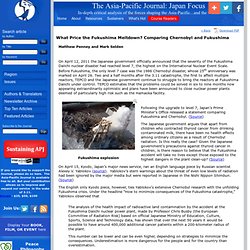
Comparing Chernobyl and Fukushima Matthew Penney and Mark Selden On April 12, 2011 the Japanese government officially announced that the severity of the Fukushima Daiichi nuclear disaster had reached level 7, the highest on the International Nuclear Event Scale. Before Fukushima, the only level 7 case was the 1986 Chernobyl disaster, whose 25th anniversary was marked on April 26. Two and a half months after the 3.11 catastrophe, the first to affect multiple reactors, TEPCO and the Japanese government continue to struggle to bring the reactors at Fukushima Daiichi under control.
Following the upgrade to level 7, Japan’s Prime Minister’s Office released a statement comparing Fukushima and Chernobyl. The Japanese government argues that apart from children who contracted thyroid cancer from drinking contaminated milk, there have been no health effects among ordinary citizens as a result of Chernobyl radiation. 1. Video.google.com/googleplayer.swf?docid=8108869343106251264&hl=fr&fs=true. MIT NSE Nuclear Information Hub ( Safety Limits: What are they?
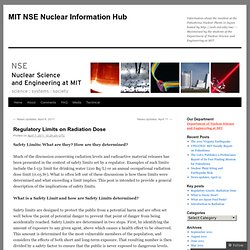
How are they determined? Much of the discussion concerning radiation levels and radioactive material releases has been presented in the context of safety limits set by a regulator. Examples of such limits include the I-131 limit for drinking water (210 Bq/L) or an annual occupational radiation dose limit (0.05 Sv). What is often left out of these discussions is how these limits were determined and what exceeding a limit implies. This post is intended to provide a general description of the implications of safety limits. What is a Safety Limit and how are Safety Limits determined? Safety limits are designed to protect the public from a potential harm and are often set well below the point of potential danger to prevent that point of danger from being accidentally reached.
Information about the incident at the Fukushima Nuclear Plants in Japan hosted by. Nuclear Power: It’s Like Keeping A Dirty Bomb In Your Backyard. In light of the disaster in Japan, nuclear power has been put on trial worldwide.
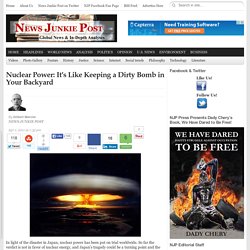
So far the verdict is not in favor of nuclear energy, and Japan’s tragedy could be a turning point and the final political nail in the coffin of a dangerous technology. The world’s worst atomic disaster since Chernobyl in 1986 is proving hard to contain and has forced worldwide debate on the benefits and dangers of nuclear energy. The fact that nuclear-power plants should never be built in seismic areas should no longer be up for debate, but other parts of the discussion over the viability of nuclear energy remain wide open.
On one hand, the Green movement, with Greenpeace in the lead, argues that nuclear-power plants can never be made completely safe despite improvement in design. Nuclear engineering other topics Forum. Why Fukushima Isn’t Like Chernobyl. Despite media hype about the radiation dangers, the Fukushima nuclear crisis won’t end like Chernobyl, Alexander Sich tells The Diplomat.
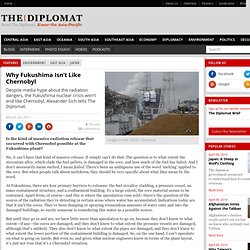
Is the kind of massive radiation release that occurred with Chernobyl possible at the Fukushima plant? No, it can’t have that kind of massive release. It simply can’t do that. Trending catastrophe music. Are certain songs trending because people connect them mentally to recent news?
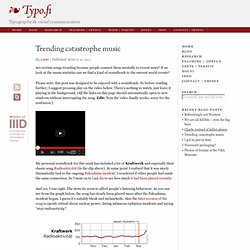
If we look at the music statistics can we find a kind of soundtrack to the current world events? Please note, this post was designed to be enjoyed with a soundtrack. So before reading further, I suggest pressing play on the video below. There’s nothing to watch, just leave it playing in the background. (All the links on this page should automatically open to new windows without interrupting the song. My personal soundtrack for this week has included a lot of Kraftwerk and especially their classic song Radioaktivität (in the clip above). And yes, I was right. The graph displays how many times the song has been played by last.fm users. This made me wonder if people had been inspired to play other songs dealing with radioactivity and nuclear power. Kate Bush’s Breathing is about nuclear war. Testez vos connaissances avec le quiz apocalypse nucléaire. GE_BWR_Containment_Diagram. Japanese redditors: we need your help. We got this document in japanese about the real situation at Fukushima and the danger for the people in Tokyo. Can someone translate it? : japan.
Xkcd. OSH Answers: Radiation - Quantities and Units of Ionizing Radiation. What is ionizing radiation?
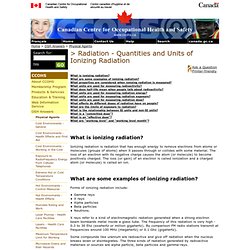
Ionizing radiation is radiation that has enough energy to remove electrons from atoms or molecules (groups of atoms) when it passes through or collides with some material. The loss of an electron with its negative charge causes the atom (or molecule) to become positively charged. The loss (or gain) of an electron is called ionization and a charged atom (or molecule) is called an ion. What are some examples of ionizing radiation? Forms of ionizing radiation include: Gamma raysX rays Alpha particles Beta particles Neutrons. X rays refer to a kind of electromagnetic radiation generated when a strong electron beam bombards metal inside a glass tube. Some compounds like uranium are radioactive and give off radiation when the nucleus breaks down or disintegrates.